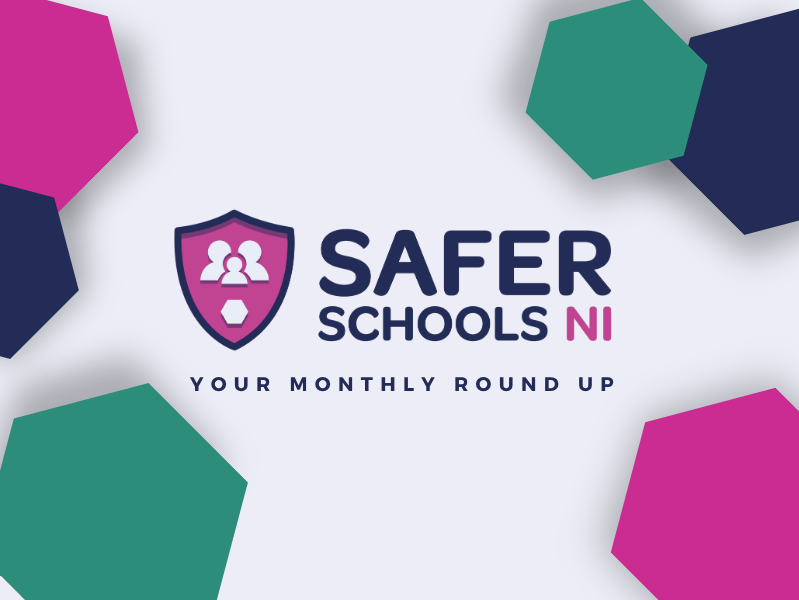Last Updated on 24th February 2023
Read the script below
Hello, and welcome back to the Safeguarding Soundbites, the podcast that brings you all the latest in safeguarding news and updates. This week, we’re talking about a Safeguarding Update from our online safety experts dealing with new type of game on Roblox that is posing a risk to children and young people, Google Play Store apps aimed at children that do not comply with data protection laws, and more. Make sure you listen in!
With the majority of users on popular online gaming platform Roblox being under 16, our online safety experts are always alert for any potential risks present on the platform. This week, we released a ‘Safeguarding Update’ about a collection of games trending within the platform. The ‘depression room’ games depict themes of isolation, cutting, and suicide with some chatrooms where users engage in unmoderated discussions around hopelessness, depression, self-harm, and suicide. With 75% of children not receiving the mental health assistance they need, it is worrying that vulnerable children may be turning to these kinds of online communities for support and advice. Several of these games on Roblox already have up to 5.6 million visits and are advertised as being appropriate for ‘all ages’. Despite being explicitly against the platform’s Terms of Service and our online safety experts reaching out to warn Roblox to request the urgent removal of these games, the platform has failed to remove the majority of them, at this time.
Our team of online safety experts delved into the potential harmful effects of ‘depression rooms’ and how children and young people could be exposed to them. It is crucial for parents and caregivers to stay informed, employ safety settings, and encourage open communication with children and if necessary, seek support from a professional. For more information and practical advice, check out our Safeguarding Update on our website at saferschoolsni.com.
In the news this week, research from Comparitech has found that as many as one in four apps aimed at children on the Google Play app store do not comply with the Information Commissioner’s Age-Appropriate Design Code, which set out standards that online services must follow in order to comply with the UK data protection law for children. The majority of children’s apps that were examined within Google Play violated these guidelines, specifically around collecting personal data of some nature from users under the age of 18. Information collected included IP addresses, full names of users, addresses, telephone numbers, and geolocations.
The NSPCC have released a report showing how child abuse image offences have soared in the UK over the past year, with over 30,000 offences reported to the police. This is a 66% increase on figures released five years ago. The NSPCC have attributed the rise to young people being groomed to share images of their own abuse with others online. They also cite tech companies failing to stop their platforms from being used to “organise, commit and share child sexual abuse.” More than 4,000 of the incidents were reported on Snapchat while 3,000 were reported on Meta’s platforms, such as Facebook and Instagram.
Aiming to combat the issue of child sexual abuse imagery, a Protech app project named ‘Salus’ has recently received £1.8 million in EU funding. The new app uses AI to identify possible child abuse material online and prevent users from viewing it. However, despite its promising potential, some concerns and questions have arisen as the app is being tested by volunteers who have acknowledged their attraction towards child sexual abuse materials and are seeking help to refrain from viewing them. The Lucy Faithfull Foundation is one such organisation that provides a helpline to those who wish to stop downloading illegal images, including convicted paedophiles. In partnership with SafeToNet, the Internet Watch Foundation are helping to train the AI to respond effectively to the encountered material. Currently in the pilot stage in five countries, the app’s effectiveness remains to be seen, but it has been hailed as a “positive step in the right direction” towards combating this critical issue.
A heartbreaking story that made headlines across the UK and Ireland on Thursday detailed the attempted murder of senior police officer Detective Chief Inspector John Caldwell of the PSNI on Wednesday night. Caldwell was off duty and coaching his son’s football team at the Youth Sports Centre when he was shot multiple times in front of his son and other young people by masked men, who then fled the scene. He remains in critical but stable condition in hospital. Caldwell is a well-known officer who has often been seen in the media while leading a number of high-profile murder investigations, including the recent murder of Natalie McNally, the killing of journalist Lyra McKee, and the ongoing investigation into the murder of PSNI officer Ronan Kerr. The PSNI are treating Caldwell’s case as an attempted murder investigation, attributing it to “violent, dissident republicans” who have formed the New IRA. Leaders across the UK and Ireland have condemned the actions while calling on anyone with information to come forward.
This incident follows a recent string of attacks in Northern Ireland that have involved children, including the placing of an explosive device near an active children’s football game in Gobnascale, and a 15-year-old boy attacking police officers with an axe after committing arson. All perpetrators have been caught and are facing sentencing. Government officials have called out the need for “stronger deterrents against crimes like this” to be put in place. This is especially important, as they have the potential to severely alter the futures of children in Northern Ireland and how they will grow and thrive in their communities.
That’s all from us this week! Join us next week to stay up to date with all the latest in safeguarding and how to keep the children and young people in your care safer online. Remember to share this episode with family, friends, and colleagues, and follow us on social media by searching ‘Safer Schools NI’ on Facebook, Instagram, and Twitter.
Until next time, stay safe!
Join our Safeguarding Hub Newsletter Network
Members of our network receive weekly updates on the trends, risks and threats to children and young people online.
Who are your Trusted Adults?
The Trusted Adult video explains who young people might speak to and includes examples of trusted adults, charities and organisations.
Pause, Think and Plan
Use our video for guidance and advice around constructing conversations about the online world with the children in your care.








